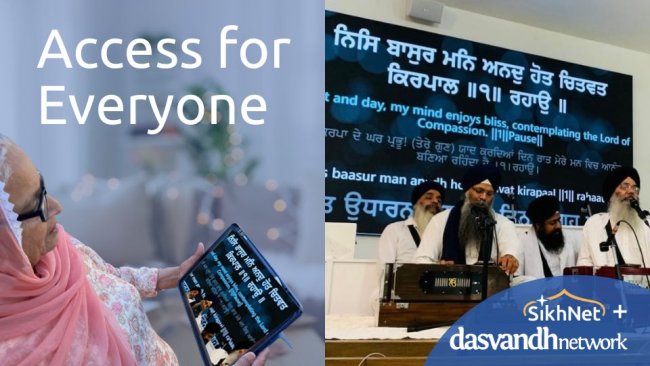On January 5th, millions of people around the world celebrated the 350th birthday of Guru Gobind Singh Ji, the tenth teacher of the Sikh faith. We honored him with pilgrimages, services, stories, and sweets. But this moment offers more than celebration.
In our current moment of political and moral crisis, the Guru’s birthday offers an opportunity for reflection. His life shows us the path of spiritual activism -- how to fight for justice through the ethic of love, even in an era of rage.
Guru Gobind Singh (1666-1708) lived in a time when an empire waged war on religious minorities and struck fear in the hearts of the people. His father was beheaded by a Mughal ruler for defending religious minorities. Guru Gobind Singh took his father’s place as the spiritual and political leader of the Sikh community. Refusing to bow down to tyranny, he inspired Sikhs to lead the lives of Sant Sipahi, Warrior Saints. The Warrior Saint is committed to fight for social justice, not with fear or hate, but through love and devotion.
In paintings, the Guru is often depicted with a bow and arrow, sword in hand, falcon on his shoulder, the fierce warrior. But sometimes we find him holding a musical instrument, the devoted saint. He is both. He shows us the courage to face the fires in the world and our own lives with a warrior's heart and saint's eyes.
The fires burn bright right now. It’s a time of enormous rage and explosive nationalism in America and around the world. You may feel depressed, confused, or hopeless. You may even want to give up. In Guru Gobind Singh’s time, forty soldiers abandoned him during a great battle. When they returned to their village, a woman Mai Bhago told them: You will not hide from the fire. You will return to the fight - and I will lead you. Donning a turban, mounting a horse with a sword in her hand and fire in her eyes, she took them where no one else would. She became the one she was waiting for.
Today we do not need literal weapons to fight for justice. We can choose to use our voices, pens, cameras, degrees, and mics as modern-day swords and shields. We just need the courage to go toward the flames.
We can turn to our wisdom traditions for practices that give us courage. In his time, Guru Gobind Singh designed the Dilruba, a string instrument small enough for his soldiers to carry on their backs into the battlefield, so that they could touch the space of joy and love through music, song and poetry in the mornings before they faced the fire.
As an activist, my law degree is my sword, my film camera my shield. In this painful time, I have started learning the Dilruba in an effort to ground my activism in a deeper spiritual practice. Playing the instrument for a few minutes each day has become my sweetest release.
What is your sword? What is your Dilruba?
Here are three practices to walk the path of the Warrior Saint:
1. Simran, remembering Oneness. When do you feel most at peace? What practices can you integrate into your daily life that quiet the ego, the voice in your mind, even for a moment? Consider: dance, yoga, kirtan, meditation, walks, music, prayer. I hide away my phone and laptop in order to fully embrace my practice. When the voice quiets, something marvelous happens: time stops and I’m free. Can you practice your Dilruba once a day, starting with 15 minutes?
2. Sangat, beloved community. Who brings out the best in you? Whose love gives you strength? In moments of crisis, I call on my mother and father, husband, best friends, and the memory of my ancestors. But I have learned that I am even stronger when I gather with my Sangat regularly, not just when I need them. So now we bring family and friends together in gatherings called “movable sanctuaries.” We walk in the woods, go to museums, laugh, watch our children play, let joy in. Can you gather with your Sangat at least once a week?
3. Seva, spiritually-grounded service. In the Sikh faith, we pray to remember God (simran) but we serve to realize God (seva). The traditional model for seva is langar (serving a communal meal). But in times of crisis, seva requires us to fight against injustice. Pick up your sword. What training do you need to wield it? Can you practice with it once a week? Write the op-ed. Post a video. Volunteer for a cause that moves you. Donate. Call your representative weekly. Show up to marches and vigils. Exercise your voice. If you ground your life in simran and sangat, then love will show up in your seva. This is how love becomes revolutionary.
Finally, remember that warriors do not go to battle alone. Guru Gobind Singh Ji -- and so many prophetic leaders -- show us that when we stand up to tyranny together, we can win. So let’s do this together. Find your modern-day sword and Dilruba, then act.
Ready to stand up and fight with #RevolutionaryLove?
Sign up here to receive weekly calls to action in your inbox: revolutionarylove.net
….
The Revolutionary Love® Project harnesses the ethic of love to fight for social justice. Follow at @valariekaur.






